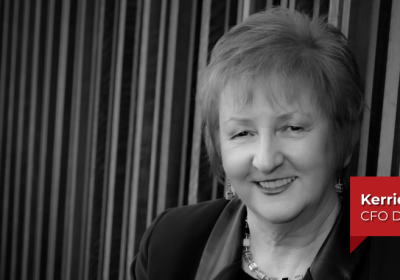
- Author: Richard McBride | CFO Magazine Editor
- Posted: June 8, 2020
Catalyst for Success > The CFO & the Board
CFO Magazine Editor, Richard McBride had the opportunity to sit down with Independent Director, Sara Brownlie and CFO, Gareth Evans at Catalyst IT, New Zealand’s largest open source development company. Headquartered in Wellington, the ‘Silicon Valley’ of NZ, with offices around New Zealand, Australia, and Europe Catalyst IT have an impressive headcount of almost 350 staff. We discuss the relationship between the board and finance, preparing for a pandemic, plus balancing the challenges and opportunities of being an inaugural CFO.
RM: Catalyst IT is a classic NZ success story – Can you share a little on the history, size, and growth of this fantastic silent achiever?
SB: Catalyst IT has been in business since 1997 as an open source technology provider. In its first year there were 5 staff and 20 clients, including Plumbing World, Electricity Corporation of NZ (now Transpower), Inland Revenue Department, and Independent Newspapers. In 1999, Catalyst client base expanded providing technology solutions to clients like NZ Electoral Commission, NZ Transport Authority and Energy companies. Over the next 10 years, the business leapt to 120 staff and 150 clients, including NZ Post, NZ Racing Board, Ministry of Education, and a number of tertiary education providers in NZ, Australia and UK. Now in 2020 the Catalyst Group spans four countries (UK, Australia, Ireland and NZ), has nearly 350 staff and 725 different clients; a mix of private and public sector and across multiple industries.
Catalyst focusses on developing long term relationships with clients, is an active contributor to the global open source community and values openness and diversity. It provides technology consulting services (business and technical), design and software development (using a range of open source languages and frameworks), e-learning solutions, cloud-based hosting and outsourced support.
Clients typically have unique business requirements that need custom software solutions to realise business value. Leveraging open source provides a powerful and mature set of technologies and frameworks to deliver optimal solutions without licensing fees or limits on what can be achieved. Open source provides a solution that can evolve over time – providing flexibility as a business grows and changes.
RM: Sara, you joined the Catalyst Board two years ago as their first independent member. With close to three decades of CFO / finance leadership experience, how did you approach the transition from a CFO role to the Board?
SB: Catalyst IT engaged me to provide some consultancy advice to them mid 2017 on their growth strategy. Later that year they approached me about joining their Board as their first independent member. They were seeking an independent member to increase the rigour and diversity in their strategic decision-making as the other Board members all worked in a daily basis in the business. It was recognised that long term sustainability required them to consciously address long term succession and to develop a structured approach to growth and financial stability. I joined the Catalyst.net Board in January 2018. This is a subsidiary of Catalyst IT, focussed on the NZ services part of the business.
Moving into a role of governance after a career in senior financial leadership roles, most latterly as a CFO in the NZ Government; required a change in approach. I have always been action-oriented; I would identify an issue or problem, develop a strategy, consult to refine, and improve, and then put into action. As a Board Member you are creating change by providing direction rather than action, so critically evaluate; ask questions and seek information using a range of styles. I needed to fit into their culture and respect the success that had occurred before me, whilst creating challenge to best contribute and encourage future success.
RM: In 2019 Catalyst made the decision to employ their first Chief Financial Officer – What qualities, skills & qualifications did the Board look for when searching for a CFO and what difference has a CFO made to the business?
SB: Midway through 2018, the Managing Director, Don Christie and I started having conversations about steps that could be taken to lift the financial maturity of Catalyst. There was agreement that Catalyst had successfully operated to date with Directors driving the client and investment strategy supported by a strong financial team delivering annual accounting and compliance needs. It was recognised that to take the company to the next level it now needed the capability and capacity to also provide more insightful and value adding financial decision support.
I prepared a presentation for the Board at the end of 2018 outlining how improved financial maturity could benefit the company. The decision to employ a CFO recognised that the company would benefit from having more robust analytics to inform strategy setting and more coherent logical cascading into annual team workplans with clear measures and risk plans.
The CFO for Catalyst needed to be someone where financial nous and expertise were like second-nature; but we also wanted someone who would appreciate the company’s commitment to open source technology and its contribution to a wider community to make things better. We wanted a strong communicator who could teach financial and commercial skills across the business and who demonstrated a drive and aptitude to take Catalyst to another level.
RM: Gareth, with no predecessor to ‘hand-over’ or provide a succession plan, what were the biggest challenges and opportunities commencing the role?
GE: Initially I completed a massive discovery phase to get the lay of the land to fully understand the challenges and opportunities for the business and specifically the financial operations. Early on I was able to appreciate the great finance team and financial controller who had been doing a really good job at managing cash and compliance. However, I could also see that there was loads of potential to really make a difference to the performance management of the company by turning information into insights to guide decisions. Hence my finance roadmap was born.
I focussed on developing an approach to improve the capture of information in the finance systems, implement better analysis and develop a new suite of KPIs and reporting. The biggest challenge was managing these changes while being able to advise the business and deliver some quick wins in how information was presented to management and the Board. This was a case of highlighting the ‘So what?’ with the information we already had.
The focus then turned to implementing enhanced budgeting and forecasting tools and training managers on how to provide timely and informed input. I have promoted a deliberate strategy to improve the resilience of the operating bottom line and balance sheet. Catalyst has grown organically overtime and there has been lots of information to unravel. I have made a real point of positioning Finance as a partner to the business so that everyone understands what we want to achieve and how they can contribute.
We are now starting to get a real feel for what does the next level of growth and ‘performing well’ actually looks like. In my previous roles I have been privileged to work under some skilled CFO’s. I have taken on board their lessons, and being Catalyst’s first CFO is a fantastic opportunity to forge my own way and see the positive impact of these improvements
RM: As a global company Catalyst were preparing for Covid-19 ahead of most NZ organisations – What measures were put in place and how ready were you for what rapidly became a Stage 4 lockdown?
The Catalyst Board was monitoring the situation in China as we went into Christmas and from January began taking steps to shore up the resilience of the company to weather any impact if the Coronavirus experienced global spread. Particular steps taken during January and February included preparing detailed forecasts to support applications to extend credit lines, obtaining detailed information on any expenditure that could be curtailed and on key clients, and on ensuring sufficiency of infrastructure to provide stable working from home. During March Catalyst then moved to test those solutions, discussions occurred with banks and the Board discussed on/off ramp decisions for different scenarios. When NZ’s lockdown was announced at the end of March, Catalyst was ready to work from home, had additional financing organised and had identified the early warning signals we wanted to regularly review so we knew when to pull different expenditure levers. Catalyst established an internal crisis team consisting of staff across the business to ensure comprehensive coverage of any issues and strong communications with our teams and customers. Catalyst so far has been well served by having an amazing team who banded together, a consistent long term trusted relationship with our bank, the ability to easily keep working from home and a diverse client base. We are still concerned about the future but have confidence that if we keep delivering great solutions to our clients, and value our staff, then even as times get tough that we will pull through.
RM: Gareth, how did and finance team support this unprecedented time? How can CFOs best add value in times of crisis?
GE: In a services industry, it is paramount that you value your people. Salaries are a large proportion of our cost base, but our people are the key to coming out the other side of this crisis. It was therefore really important for clear consistent messaging to go out to the team that their personal safety was first and foremost the largest concern for the company.
Next we needed to communicate that responding to this crisis could mean some hard decisions but that we were committed to surviving and we all needed to play our part to get through. Our people are extraordinary and we knew that keeping everyone together would be best for the company long term. Finance had work to do to provide the financial planning that would ultimately allow us all to keep a cool head and not panic. The key to this was modelling a range of scenarios and understanding what decisions we would need to make, and when we would need to make them in each case.
The finance team pulled together and implemented cost cutting options, partnered with teams to assess revenue and sales opportunities, kicked off a revenue risk review & helped inform a strategy for the year that focusses on key clients. We also talked to the bank very early to ensure that we had adequate funding, while the team quickly improved internal processes from more regular billing to better cash flow monitoring.
As CFO, I was really fortunate to have a finance team who knew the detail very well and that I had developed relationships across the business so that I could pull the information and develop recommendations. I think that CFO’s really add value in times of crisis through a deep understanding of the economics of a business, by keeping a cool head and presenting clear, actionable recommendations.
RM: The next decade will be vastly different to our 2019 expectations. With global border restrictions and social distancing likely to be in place for the foreseeable future how has this changed or reshaped the focus of Catalyst? – Many of your clients are higher-education providers, a sector heavily impacted by Covid-19. How are you supporting existing clients, and will it be possible to refocus on new verticals less affected going forward?
SB: Catalyst is anticipating that borders could remain closed and that social distancing will continue for a long time yet. Is it fortunate that staff can easily work from home and Catalyst has implemented an open source web conferencing tool called Big Blue Button which allows for seamless video discussions across the company and with global and national clients. We have continued to provide software lifecycle and hosting services with minimal disruption. However, our clients have experienced disruption and for some, unfortunate financial impacts. This will impact on demand for services from our clients in some sectors, like tourism, entertainment, hospitality and airlines.
Further there have been big changes for our clients in the education sector and the Catalyst Managing Director, Don Christie has been actively leading communications in this area. Catalyst has been promoting online education platforms to facilitate remote learning for universities, polytechnics, and corporates since 2003. One key platform, Moodle, is among the world’s most widely used, open-source learning management systems. Catalyst has taken these platforms into some of the most difficult-to-access parts of the world (e.g. projects with clients such as Doctors Without Borders (also known as Médecins Sans Frontières) and UNICEF). Catalyst is already experienced in operating in places with health crises and conflict zones. Having previously worked with Monash University in Melbourne, Australia to deliver an online exam platform, the company is now getting requests to implement the platform by universities in Canada, the United Kingdom, and Ireland.
Catalyst had a diverse client base before the pandemic. This means that although some of our clients are negatively impacted we anticipate sufficient depth will allow us to focus on less affected sectors. However, Catalyst is also helping those who are affected through the provision of free cloud hosting for 6 months for those businesses who need a quick online business solution stood up.








